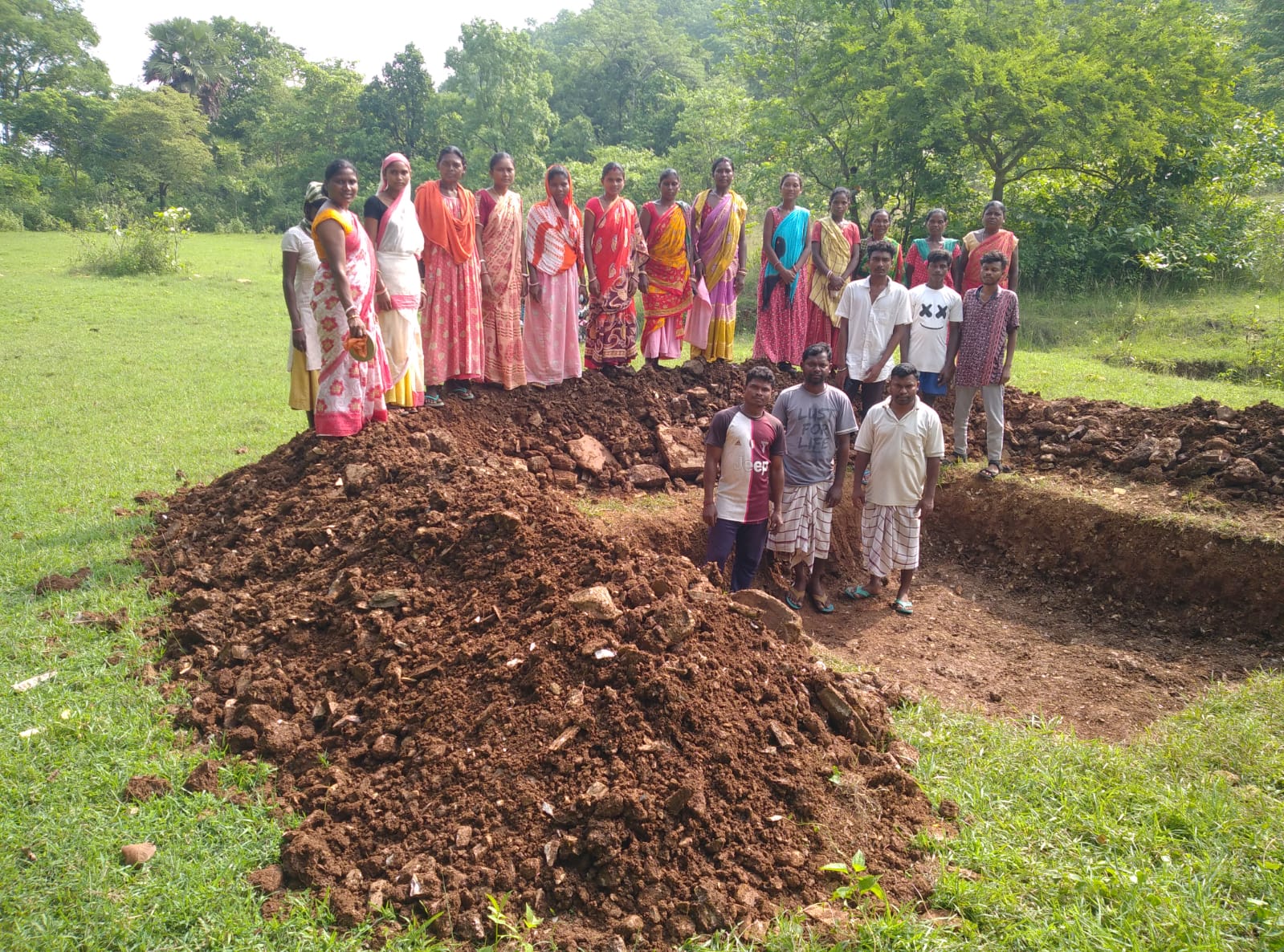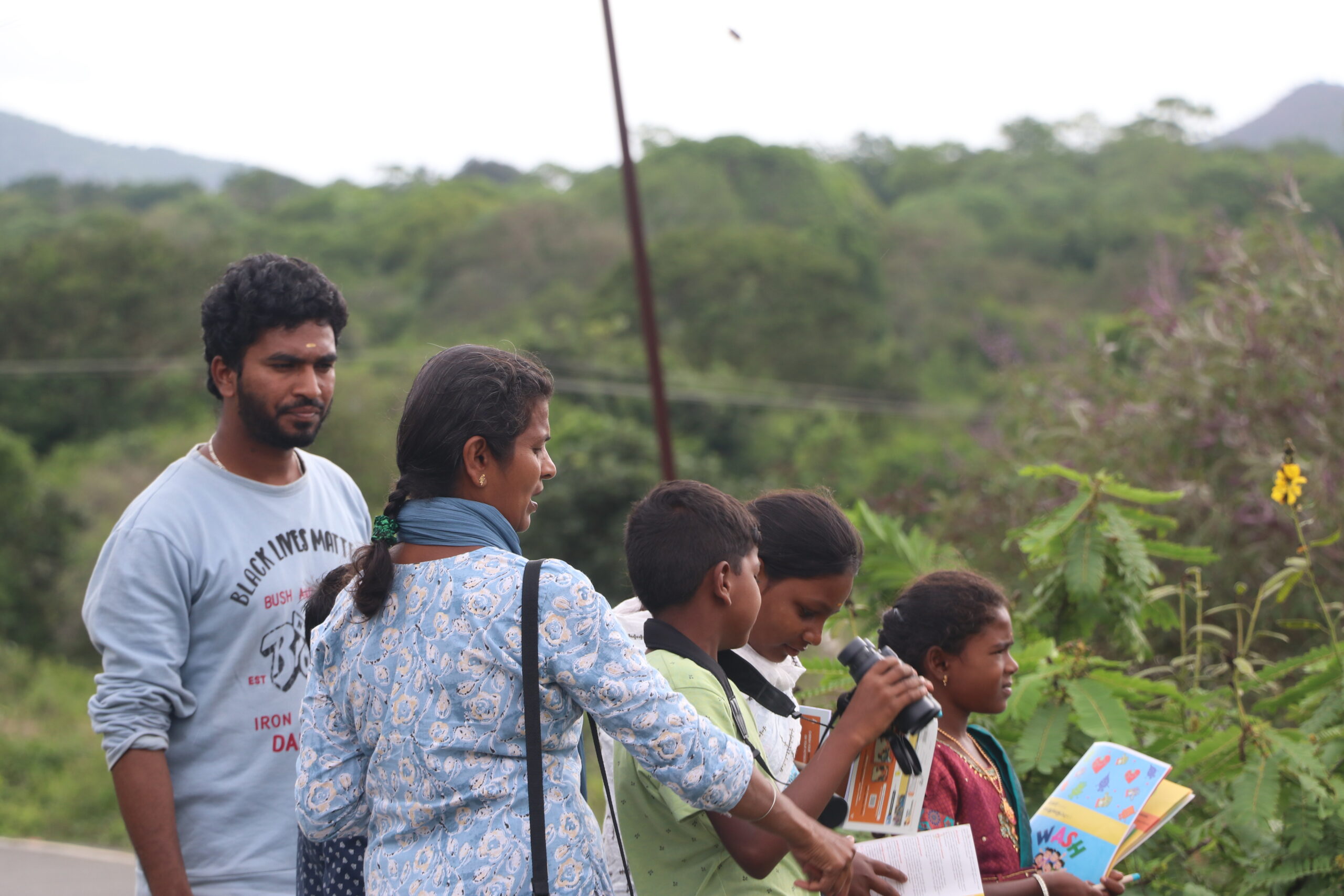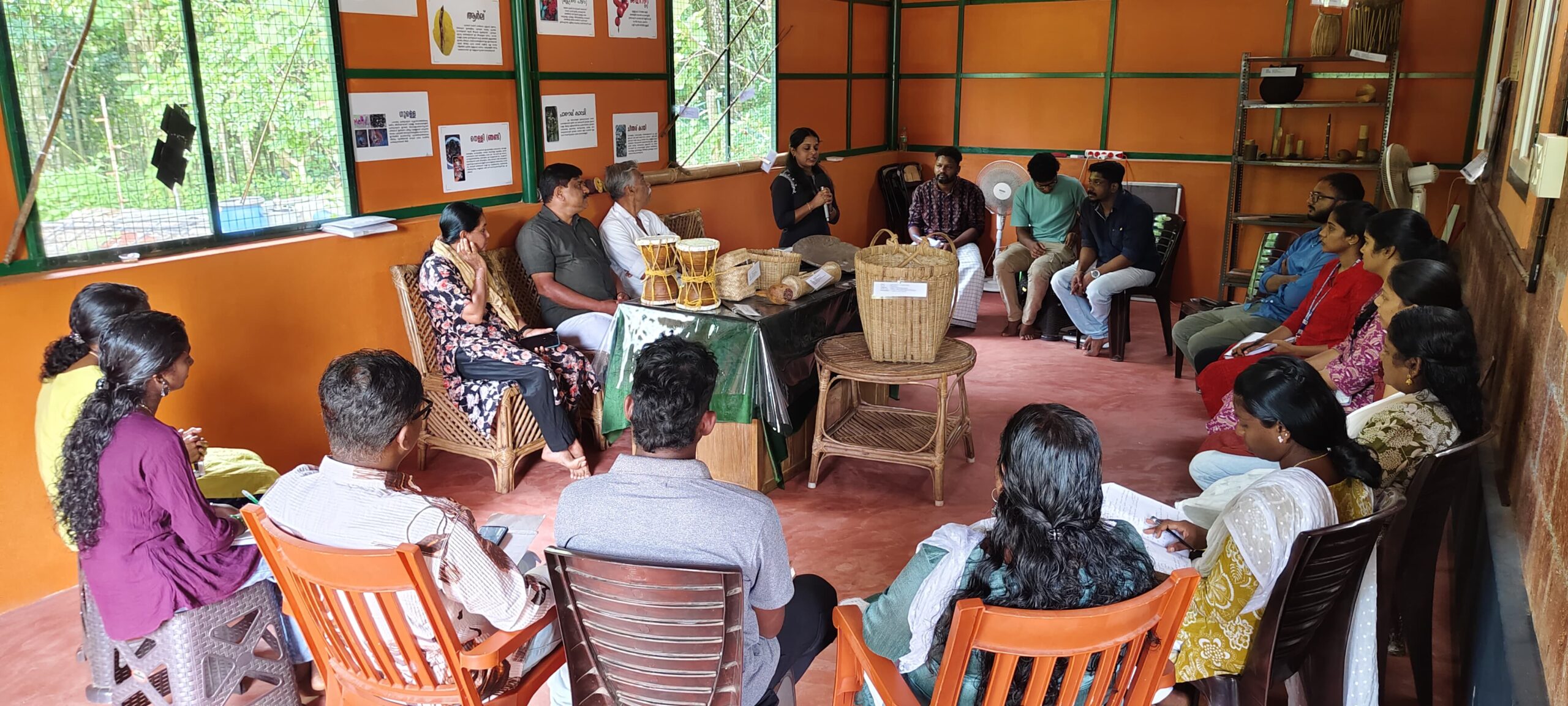By Jagabandhu Sanda, Baby Patar, Kapra Mahali, Sulekha Rani Mahato, Dulari Hansda and Budheswar Mahato
Keystone Foundation has been working in several villages of East Singhbhum and Seraikela-Kharsawan districts of Jharkhand to promote Agroecology, Natural and Ecological Farming practices. Agriculture continues to be an integral part of the lives of the communities we work with in these areas, making vital contributions to health, nutritional and livelihood security. Even families with limited land resources cultivate a variety of crops and vegetables in their homestead plots / Badi or Kitchen Gardens.
The Badi is a source of a diverse variety of crops like Maize, Sorghum, Rahar / Pigeon pea, Turmeric, Ginger, and several vegetables like Bitter Gourd, Bottle Gourd, Ridge Gourd, Okra, Brinjal, Tomato, Tubers and greens. This ensures dietary diversity to meet nutritional needs and also provides additional income from the sale of surplus produce.
However, this homestead cultivation is primarily rain fed, and climate change poses serious threats to these practices. Reduced and erratic rainfall is negatively impacting crop health and productivity, posing challenges to the viability of continued cultivation. In order to address these challenges, the CRPs of these areas – Baby Patar, Kapra Mahali, Sulekha Rani Mahato, Dulari Hansda and Budheswar Mahato, consultant Jagabandhu Sanda, along with the local community have undertaken and implemented several pilot water conservation initiatives to address water scarcity issues in homestead cultivation. These efforts included the establishment of pilot Poly-lined Tanks and Recharge Pits.
Poly-lined Tanks
A total of 7 Poly-lined tanks were constructed and set up to facilitate irrigation of homestead plots. 3 tanks were established in Musabani Block and 2 in Gurabanda Block of East Singhbhum District and 2 in Seraikela-Kharsawan District. These tanks were constructed adjoining homestead plots. They were 10 feet square and 5 feet in depth, and lined with plastic sheets, which were covered with mud on the sides to prevent them from slipping into the tank.
The mud from digging the tank was used to make bunds around the tank and vegetable cultivation is being carried out on these bunds. Bamboo fencing of the tanks has been done to protect them from livestock and also safeguard children. Climate Change has resulted in erratic monsoons with longer dry spells which threatens survival of crops in homesteads. The Poly-lined tanks are already helping irrigate crops during dry spells like the one experienced during the end of July, a clear sign of water conservation. In addition to enabling cultivation of the Badi during periods of water scarcity these tanks are also being used to rear fish and ducks. During the Summer months families will fill the tanks from village water sources, and we are also exploring the possibility of establishing drip irrigation systems.
Recharge Pits
Recharge pits allow rainwater to replenish groundwater by recharging the underground aquifers. They can be built to recharge a borewell or just to help the water infiltration in an area. A total of 39 recharge pits have been established – 12 in Gurabanda Block, 15 in Musabani Block and 12 in Seraikela-Kharsawan. Each pit is 3 feet square and 3 feet in depth, and filled with rocks to ensure percolation of water to recharge groundwater and prevent evaporation loss.
These recharge pits have been made in homestead plots, positioned where rainwater flows out of the plot to help reduce loss of rainwater and ensure better recharge of groundwater. The pits will help increase moisture content in the soil in the homestead plots, enabling the respective families to cultivate their plots for a longer duration. It is estimated that these pits with help increase cultivation period by around 1 month in the first year, 2 months in the second year and 3 months in the third year.
These estimates are based on the experiences of Jagabandhu Sanda, who has set up and worked with such recharge pits in the past in other parts of Jharkhand. In addition to helping increase the duration of cultivation in homestead plots these recharge pits will also contribute to recharging ground water in the area which will help ground water-based infrastructure like bore wells and hand pumps.
While financial expenses of constructing the poly-lined tanks and recharge pits were met by Keystone Foundation through the Eastern India project, the local community contributed necessary labour. In all areas members of women’s groups, youth groups and farmers enthusiastically came forward to help with construction work.
Community Feedback
Feedback from some of the families regarding the Poly-lined tanks and recharge pits is as follows –
Poly-line tank feed back
Sunil Hembram from Patkita, Musabani Block, East Singhbhum District said that “I try and cultivate vegetables for all 12 months of the year but did not have irrigation facility which made it challenging. You (Keystone Foundation) have provided me with a source of irrigation.”
Deepa Mardi from Bhadua, Musabani Block, East Singhbhum District said that “There are 20 members in our women’s group and the Poly-lined tank will enable us to cultivate vegetables even after the monsoons. We will use these vegetables to meet our self-consumption needs and also sell them to generate income.”
Suman Hansda from Bakra, Musabani Block, East Singhbhum District said that “I did not know about Poly-lined tanks (before this initiative). After doing Poly lining water filled up in my tank. Along with vegetable cultivation I am raising fish stock in the tank (Rui and Katla) and also plan to use the tank to rear ducks.”
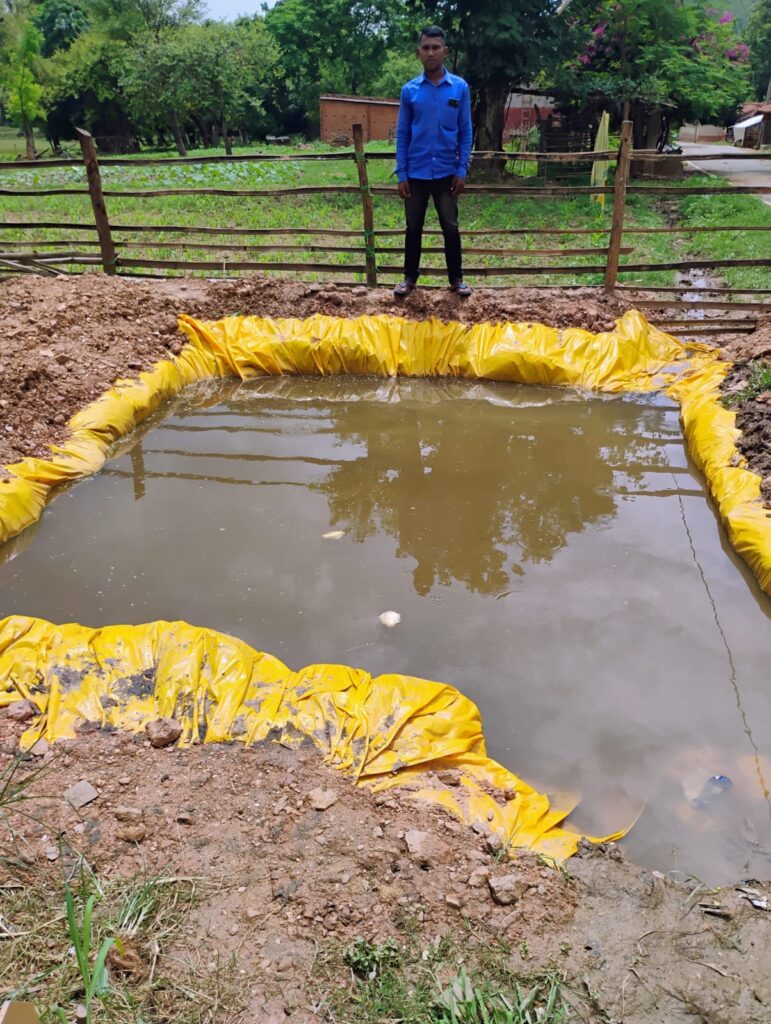
Suresh Hansda from Kalajhor, Seraikela-Kharsawan District said “My Badi / Homestead is now alive and I can cultivate crops throughout the year. I have also started Fish farming of local fish varieties Cheng and Magur and will add more from my fields. I have also started duck rearing.”
Sandha Mahato from Jaighantapur, Gurabanda Block, East Singhbhum District shared “My small pond is my prized possession because it will now have access to water throughout the year. This will allow me to cultivate vegetables around the year and in addition I will also rear ducks.”
Baghrain Murmu from Nagrapal, Gurabanda Block, East Singhbhum District shared “After a long time my dream has been fulfilled. I didn’t get a pond from the government but Keystone Foundation has fulfilled my wish. Now I will not be unemployed, I will cultivate some vegetable or the other throughout the year.”
Recharge Pits Feedback
Debprakash Sardar from Udaypur, Seraikela-Kharsawan District said “I have now learned a lesson that just like after recharging a mobile we can use it to talk, after recharging the groundwater the moisture content in the soil of my homestead increases and I can cultivate crops for a longer duration.”
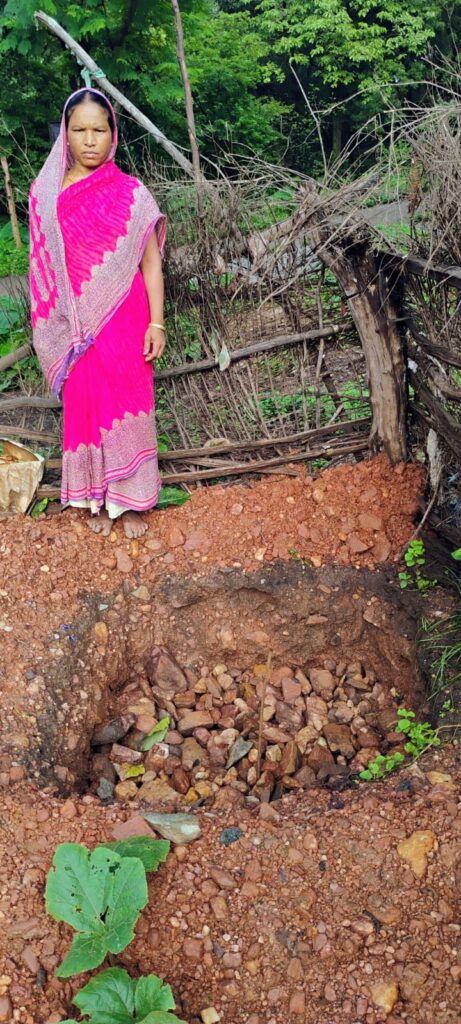
Sukurmuni Sardar from Sardabera, Seraikela-Kharsawan District said “From my childhood, I have been seeing that rainwater drains out of my Badi. This year after the recharge pit was made no water was lost from my Badi. All the water remained in the Badi, helped keep the soil of my Badi moist and recharged underground water.”

